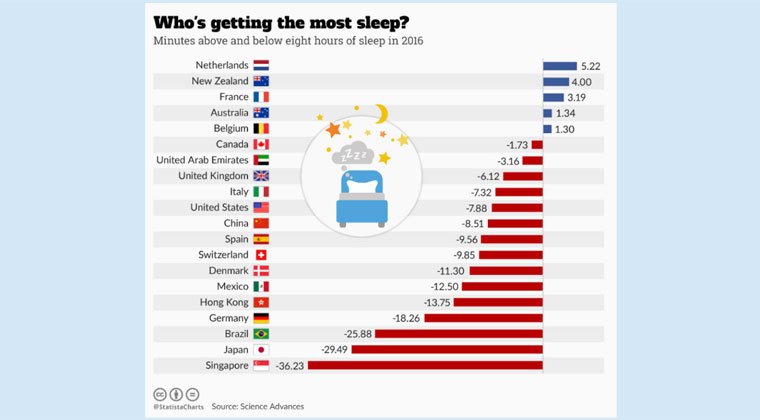Another year, another finding that confirms what we already know: Singaporeans need to stay in bed longer.
This was after the so-called "normal" sleeping habits of 5,450 people around the world has been captured -- this time in a study that uses data derived from a smartphone app.
Researchers at the University of Michigan published their findings in the journal Science Advances that was out on March 6, 2016.
It found that people from Singapore and Japan on average reported sleeping at just under seven and a half hours.
Those reporting from Netherlands got the most sleep with more than eight hours.
Those in Australia were among the earliest morning risers and also tended to go to bed earlier.
Here are some of the findings to take note, as some seem to confirm conventional wisdom, while others defy explanation:
1. The later people go to bed, the less sleep they get on average.
2. Not only that, the amount of sleep people get can be predicted with sleep time but not wake time.
3. Activities or societal pressures, or differences in light exposure do lead people to sleep later or wake up earlier. But it's still unclear if the differences in sleep times in different countries have strong correlation with these factors.
4. It is clear though that sunrise and sunset affect the time people wake up.
5. Later sunsets seemed to correlate with longer sleep durations.
6. Those who spent more time in natural sunlight tended to go to sleep earlier.
7. Women get 30 minutes more sleep than men.
8. Middle-aged men got the least sleep of all.
How data was obtained?
The data was self-reported through Entrain, a smartphone app originally developed to help with jet lag. It allows people to self-report their sleeping habits as well as tracks outside light patterns.
The technology could be developed into a wearable data tracker -- like a wristband -- that could more accurately collect data on sleeping and waking times.
Good news about sleep: One size does not fit all
If this latest data appears fishy -- because seven-and-a-half hours of sleep a night seems like a lot of sleep for Singaporeans -- well, it is.
In 2014, people in Singapore surveyed reportedly slept for six-and-a-half hours a night.
Moreover, here's more reason to take such findings with a pinch of salt: Sleep is a very personal thing and one size does not fit all.
The number of hours to sleep simply cannot be reduced to one single number, so there is no point questioning whether seven or eight hours a night is sufficient.
This is especially so when the duration has not even been firmly established for the average person, let alone different individuals of different ages engaged in different vocations.
In an explainer of sorts from 2014, it has been suggested that the amount of sleep one needs depends on circumstances. For example, one may need more sleep when one has lost sleep in previous days, or when one's immune system needs to fight an infection.
Therefore, the science could even be getting things backwards: If you sleep eight hours a day, it is not the case that you are well-rested.
This is because people who have bad health might in fact sleep more.
And why are we reporting about Singapore's sleep deprivation in May 2016 based on a report out two months earlier March?
Because we were too tired to notice it when it came out then.
If you like what you read, follow us on Facebook and Twitter to get the latest updates.
If you like what you read, follow us on Facebook, Instagram, Twitter and Telegram to get the latest updates.
